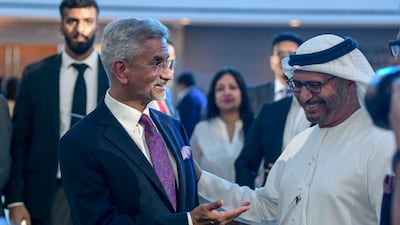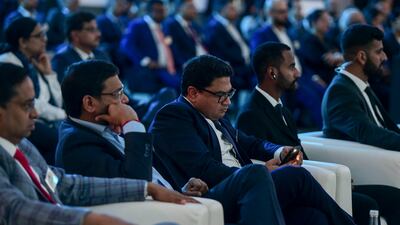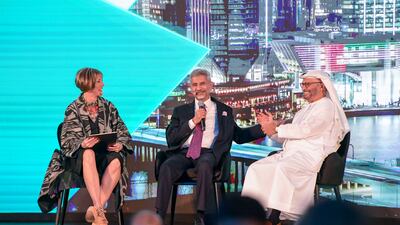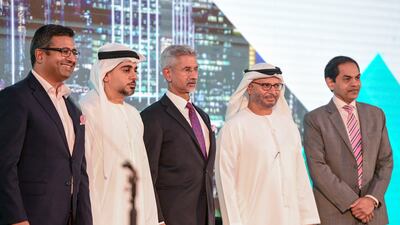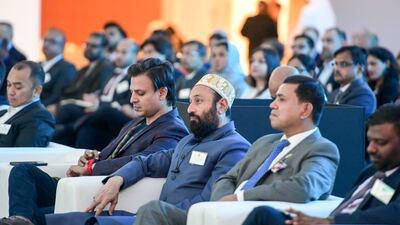The Ukraine war has caused an East-West divide but in a changing global order, the UAE and India can play a “bridging role” to help end the conflict, Indian Minister of External Affairs Subrahmanyam Jaishankar said on Monday.
Mr Jaishankar, at a panel at the India Global Forum in Abu Dhabi, said there are two major divisions in today’s world.
“One is the East-West divide centring around Ukraine and the other is a North-South divide centring around development,” he said.
“Ukraine is having an impact on development. I do believe a country like India can play that bridging role; not alone, but with countries like UAE. There is a need today to bridge [the divides],” he said.
The four-day forum, held under the theme “Partners for Global Impact”, is bringing together government leaders and entrepreneurs to explore mutual areas of co-operation and partnership.
Since the conflict began in February, leaders of the UAE and India have urged Russia and Ukraine to find a peaceful resolution.
Reiterating the UAE’s stand, Dr Anwar Gargash, diplomatic adviser to the President, said it is in the interest of everyone for the conflict to end quickly.
“The conflict will not end unless [it ends] politically. We need a political process to end the conflict,” said Dr Gargash, who shared the panel with Mr Jaishankar.
UAE-India ties having ripple impact
Earlier in his address, Mr Jaishankar listed three main factors — globalisation, rebalancing of power equations and multipolarity — that are defining the new world order.
“The globalisation that the world saw from the late 1990s until a few years ago created a 'globalisation ideology' that led to the idea of one truth, one narrative and a certain narrow set of people that will decide what is right or wrong,” he said.
“There is a contest going on in the world today. We have seen political rebalancing and economic rebalancing, but one of the toughest disputes we are entering now is cultural rebalancing.
“It is about who gets to define what is right and what is wrong. That is a very big issue in international relations right now.”

Mr Jaishankar said countries that were dormant are now seeking out more space, offering more capabilities and exercising more influence.
“It is a very different world,” he said.
He cited growing UAE-India relations as a natural example of what he termed “the return of history”.
The historic ties between the two countries, the minister said, have “centuries of comfort”.
“It is not just intrinsic, it is often intuitive,” he added.
After Prime Minister Narendra Modi’s first visit to the UAE in 2015 and the signing of the India-UAE Comprehensive Economic Partnership Agreement in February this year, the minister said there has been a “veritable transformation in our ties”.
The UAE is India’s third-largest trade partner. It is also the second-largest export market for India.
He said that India and the UAE are doing more things in more areas, such as exploring the possibility of health co-operation in Africa and taking trilateral relations with France to a ministerial level.
Mr Jaishankar also mentioned the establishment of the I2U2 mechanism between India, Israel, the UAE and the US as “yet another example of how our changed relationship is now beginning to have a broader, ripple impact”.
“We have known each other for long, but rediscovered each other only in 2016. With Cepa, ties have really taken off. India-UAE co-operation is not about surviving change but shaping it positively,” Mr Jaishankar later tweeted.
“So it is in many ways a very ambitious relationship because it's not limited really by its bilateral possibilities. I am very confident that, as we get deeper into the relationship, it will also make itself felt at the global level.”
Bilateral vs multilateral
In a debate on bilateral versus multilateral ties as a way of addressing global issues, Dr Gargash said that though bilateral relations are more effective, today’s world demands a multilateral approach to many issues, such as climate change.
The former minister of state for foreign affairs said dividing the world into democratic states and authoritarian states “does not work anymore”.
“There are different shades between this end of the spectrum and that end of the spectrum. I think you have to respect and accept that diversity,” Dr Gargash said.
